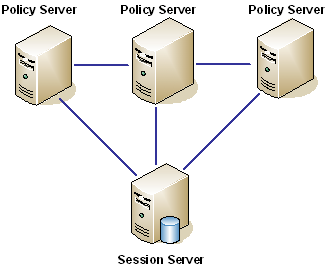SiteMinder's implementation of the following features requires a session store to store SAML assertions and user session information:
The assertion is stored in the session store until it is retrieved by the consumer (Producer/Identity Provider). A persistent session is required for this to work.
The single use policy feature prevents SAML 2.0 assertions that arrive via the POST binding from being re-used at a Service Provider to establish a second session. Time-based data about the assertion, known as expiry data, is stored by the authentication scheme in the session store at the Service Provider/Resource Partner. This data ensures that a SAML 2.0 POST or WS-Federation assertion is only used a single time. Although a session store is required at the Service Provider/Resource Partner, a persistent session is not required.
For single logout, the status of the user's session in the session store must be changed to invalidate the session. A persistent session is required at the Identity Provider and Service Provider.
For WS-Federation signout, the status of the user's session in the session store must be changed to invalidate the session. A persistent session is required at the Account Partner and Resource Partner.
To implement these features across a clustered Policy Server environment, you must set up the environment as follows:
Persistent sessions are part of the realm configuration.
Sharing the session store ensures that all Policy Servers have access to assertions when each one receives a request for an assertion.
Sharing the session store ensures that all Policy Servers have access to user session data when each one receives a request for a session logout.
Note: All Policy Servers that can generate or consume assertions or process a persistent SMSESSION cookie need to be able to contact the common session store. For example, if a user logs into example.com and gets a persistent session cookie for that domain, every single Policy Server that is handling requests for example.com must be able to check that the session is still valid.
The following figure shows a Policy Server cluster communicating with one session server:

To share a session store, use one of the following methods:
In the Policy Server Management Console, configure the Policy Server to use the designated session server.
For instructions on replicating a database, use the documentation for your database.
| Copyright © 2010 CA. All rights reserved. | Email CA about this topic |